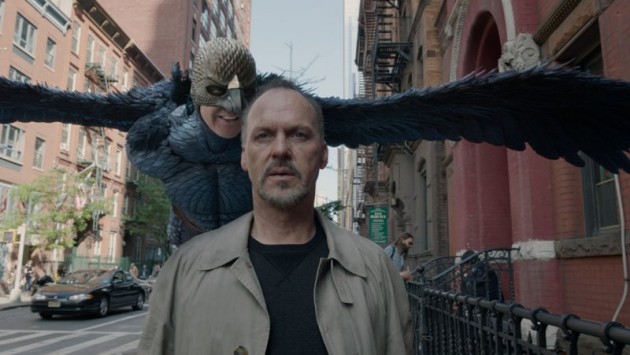There are many motifs that come to mind when discussing Alejandro González Iñárritu. A deft comedic hand is not really one of them. An overly long trip on the Expresso-Depresso bus to Interconnectivity of Life Boulevard with a brief detour through Ugly Face Of Humanity Avenue is more akin to what has come to expect from a man whose work included 21 Grams, Amores Perros and Babel. His films are often negative to a fault, as is the case with his previous effort, Buitiful, which painted a portrait so devoid of any kind of salvation that you lost all sympathy for the protagonist; if the world is so unendingly miserable, then why bother? So at first glance, Birdman Or (The Unexpected Virtue of Ignorance) is a genuine curiosity. It’s a lean two hour meditation on transience, insanity, the state of modern culture, truth and the perilous trappings of a life spent chasing adoration that’s visually and musically impressive while also being downright hilarious.
The film follows Riggan Thompson, a washed up former superhero actor, as he attempts to salvage his career and get the admiration he feels he deserves with an adaptation of Raymond Carver’s What We Talk About When We Talk About Love. This last ditch effort is threatened by a variety of sources such as obnoxious method actor Mike Shiner (Ed Norton), critic Tabitha Dickinson (Lindsay Duncan) as well as Thompson’s own decaying mental state. Throughout the film he is haunted by the voice of the superhero he once played, the titular Birdman a sort Christian Bale’s Batman interpretation of Marley’s Ghost, urging him to abandon the play and sell out. All of these factors come to a head over the course of three days as the play goes from preview to opening night.
What needs to be said outright is that the performances on display here are uniformly excellent. Michael Keaton as the egomaniacal Thompson seems to be channeling the same insanity that carried Klaus Kinski and doing a fantastic job at it. It’s the sort of the performance that people write comeback pieces over; Mickey Rourke for the 2010’s. Ed Norton does a truly excellent job as the thoroughly obnoxious, hateful but fascinating Mike Shiner. The character could very easily slide into parody, but Norton finds the middle ground. The two have a comedic energy that is a delight to behold, with many of the strongest scenes in the film being composed of those two bouncing off one another. Other performances include Emma Stone as Thompson’s daughter, Naomi Watts, revisiting a similar role she played in Mulholland Drive, as Thompson’s co-star and Andrea Riseborough as Thompson’s co-star and lover. While all three give top notch performances, Watts and Riseborough do feel very much underused, which is an absolute shame because both knock their roles out the park. Emma Stone does a very good job too in finding the humanity and warmth in a role that could have been a caricature. The fact is that everyone involved brings their A-game and much like last year’s Grand Budapest Hotel this hodgepodge of disparate actors bounce off one another to create a playful and hilarious environment.
One reason that they’re able to give such good performances is because they’re working from a stellar script. It’s thoroughly rich with metaphors and poses some serious questions about our society’s relationship to art, how it is experienced and whether, with so many different screaming voices, can anyone be really heard? Its primary focus is that of love in its various forms and the nature of truth and reality. The name of the play is based on love, paternal love between Thompson and his daughter, the physical love between Watt’s and Norton and Thompson’s quest for admiration from his critics and detractors. There is the question as to how much respect is truly worth; be it from the public at large, your heroes or your haters. One of the key recurring visual motifs is a sticker on Thompson’s mirror which says “a thing is a thing not what is said of that thing”. But in the end does it really matter? If the lifespan of humanity is just a collection of etches on a roll of tissue paper, then why devote yourself to this search?
The other chief question is that of reality and truth. Throughout the film Thompson allows himself these flights of fancy wherein he has telekinetic powers and the ability to fly. To him these seem to be absolute truths, but we know they’re falsehoods. We are watching a film about a play that strives to be as realistic as possible, yet by it’s very nature is untrue. Norton’s Shiner character is someone who is so deeply devoted to the truth that he refuses to choose anything other than it in truth or dare and yet his livelihood is spent pretending to be someone else. At their core the people here are inherently false living in a world of pretend in the theatre. The shooting style echoes this idea. Emmanuel Lubezki expands on his work from “Gravity” and shoots the film in what looks like one continuous take. But again this genuinely impressive feat is a falsehood. It’s a combination of a collection of various short scenes stitched together, but does that make it any less meaningful or worthwhile? For a film featuring a gent running around dressed up as a giant bird it quietly plants a number of deep thoughts.
The film only really let’s itself down when it becomes too blunt with it’s message. There are two key scenes that highlight this. The first of which is an interaction with Lindsay Duncan’s critic character, Tabitha. The character is thematically and narratively necessary and works as the sword of Damocles figure hovering over Thompson throughout the proceedings. Yet in a sequence when Thompson chastises her, it feels less like profound moment and more like Iñárritu throwing his toys out of the pram and screaming about how critics don’t get his work. While that may not have been the intention, it does come across that way, which is strange too as in the past Iñárritu has been somewhat of a critical darling. The second sequence is during one of Thompson’s flights of fancy wherein Birdman stares directly into the camera and critiques the audiences of blockbuster films. It feels so arrogant and misjudged. Again, you can see the thematic need for it, but it feels as though we as the audience are having a big finger wagged in our face for liking films that are not deemed worthy. It’s a feeling not dissimilar to that created by Michael Haneke’s Funny Games. As well, there are issues with the presentation and discussion of social media which do feel more unintentionally pompous. It’s such a shame too because with a slightly more deft hand, these could have been intensely powerful moments but instead they just feel too obvious and at odds with the rest of the film.
But at its core, Birdman is a legitimate excellent film and probably Iñárritu’s best work since his debut. It’s profound, deeply funny and visually breathtaking. All of this combined with it’s drum heavy score that makes it feel like the walls are closing in on you create an exhilarating and worthwhile cinematic experience. But of course, does this admiration really mean anything? Will Murphy






